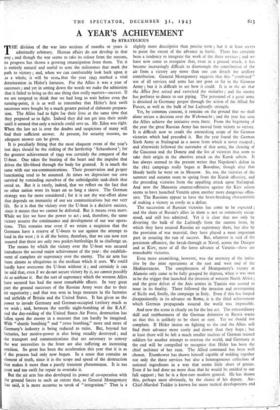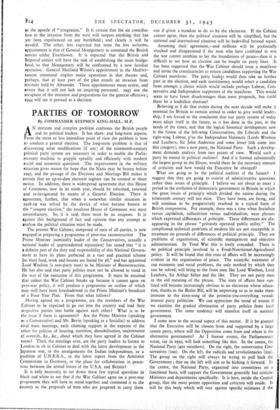A YEAR'S ACHIEVEMENT
By STRATEGICUS
THE division of the war into sections of months or years is admittedly arbitrary. Human affairs do not develop in that way ; and though the war seems to take its colour from the seasons, its progress has shown a growing emancipation from them. Yet it is entirely natural and useful to note the milestones that mark the path to victory ; and, when we can comfortably look back upon it as a whole, it will be seen. that the year 1943 marked a vital deterioration in Hitler's fortunes. For the Allies it was a year of successes ; and yet in setting down the words we make the admission that it failed to bring us the one thing that really matters—success. If we are tempted to think that we had long to wait before even the turning-point, it is as well to remember that Hitler's first swift successes were bought by a much greater period of elaborate prepara- tion. The Allies had to fight for their lives at the same time that they prepared so to fight. Indeed they did not get into their stride until it seemed that only a miracle could save us. Mr. Eden was right. When the last act is over the doubts and suspicions of many will find their sufficient answer. At present, for security reasons, no adequate answer can be given.
It is peculiarly fitting that the most eloquent event of the year's last days should be the sinking of the battleship Scharnhorst '; for the greatest achievement of 1943 was certainly the conquest of the U-boat. One takes the beating of the heart and the impulse that drives the life-blood through the body for granted. It is much the same with our sea-communications. Their preservation and proper functi9ning tend to be assumed. At times we depreciate our own survival by reminding ourselves of the unbridgeable tank-ditch that saved us. But it is rarely, indeed, that we reflect on the fact that no other nation wore its heart an so long a sleeve. The German strategy was far more considered ; for it is not the war-effort alone that depends on immunity of our sea communications but our very life. So it is that the victory over the U-boat is a decisive success, since it means that we cannot be defeated. But it means even more. While we live we have the power to act ; and, therefore, the same victory assures the continuance and development of our war opera- tions. This remains true even if we retain a suspicion that the Germans have a reserve of U-boats to use against the attempt to land in the west ; it is all the better, therefore, that we can now rest assured that there are only two pocket-battleships fit to challenge us.
The means by which the victory over the U-boat was secured introduces the second major achievement of the year : the establish- ment of complete air supremacy over the enemy. The air arm has been almost as ubiquitous as the medium which it uses. We could hardly have overcome the U-boat without it ; and certainly it can be said that, even if we do not secure victory by it, we cannot possibly do so without it. But the sort of supremacy which the western Allies have secured has had the most remarkable effects. In very great part the ground successes of the Russian Army were due to their air superiority ; and that was won in large measure in the factories and airfields of Britain and the United States. It has given us the power to invade Germany and German-occupied territory much as we wish ; and, between the terrific night-bombing of the R.A.F. and the day-raiding of the United States Air Force, destruction has fallen upon the enemy in a measure that can hardly be imagined. With "shuttle bombing " and " cross bombing," more and more of Germany's industry is being reduced to ruins. But, beyond her factories, her motive-power is also being steadily destroyed ; and the transport and communications that are necessary to convey the war necessities to the front are also suffering an increasing attrition. So great has been the acceleration this year that it is as if the process had only now begun. In a sense that contains an element of truth, since it is the scope and speed of the destruction that makes it more than a purely transient phenomenon. It is too great and too swift for repair to overtake it.
But the air arm has also developed its power of co--operation with the ground forces to such an extent that, as General Montgomery has said, it is more accurate to speak of " integration." That is a
slightly more descriptive than precise term ; but it at least serves to point the extent of the advance in battle. There has certainly been a tendency to integrate the work of the three services ; and we have now come to recognise that, even in a ground attack, it has become increasingly difficult to disentangle the contribution of the air from a victory any more than one can detach the artillery contribution. General Montgomery suggests that this " combined " use of all services and arms has not gone so far in the German Army ; but it is difficult to see how it could. It is in the air that the Allies first seized and exercised the initiative ; and the enemy has perforce to dance to our piping. The personnel of a great army is detained in Germany proper through the action of the Allied Air Forces, as well as the bulk of her Luftwaffe strength.
Yet, by common consent, it remains on the ground that we shall alone secure a decision over the Wehrmacht ; and the year has seen the Allies achieve the initiative even there. From the beginning of the year the great Russian Army has moved from victory to victory. It is difficult now to credit the astonishing scope of the German victories which had preceded it. But the year found the German Sixth Army at Stalingrad in a noose from which it never escaped ; and afterwards followed the surrender of that army, the clearing of the Caucasus and the Donetz and the list of victories that seem to take their origin in the abortive attack on the Kursk salient. It has always seemed to the present writer that Napoleon's defeat in the 1812 campaign really began at Borodino, though after that bloody battle he went on to Moscow. So, too, the victories of the summer and autumn seem to spring from the Kursk offensive, and - the preceding victories from the appalling attack upon Stalingrad. And now the Manstein counter-offensive against the Kiev salient seems to have launched Vatutin upon another more dangerous offen- sive. The Russians appear to have the heart-breaking characteristic of making a victory as costly as a defeat.
The succession of Russian victories has come to be expected ; and the share of Russia's allies in them is not so commonly recog- nised, and still less admitted. Yet it is clear that not only by diverting the bulk of the Luftwaffe from the eastern front, by which they have assured Russian air supremacy there, but also by the provision of war material, they have played a most important part in assuring the run of success. But, whatever is said of the persistent offensive, the break-through at Nevel, across the Dnieper and at Kiev, most of all the latest advance of Vatutin—these are remarkable victories.
Even more astonishing, however, was the recovery of the initia- tive by the joint operations at the east and west end of the Mediterranean. The completeness of Montgomery's victory at Alamein only came to be fully grasped by degrees, when it was seen to be the trigger that launched the invasion of western North Africa ; and the great defeat of the Axis armies in Tunisia was second to none in its finality. There followed the invasion and overrunning of Sicily and, finally, the campaign in Italy. Even if this has limped disappointedly in its advance on Rome,- it is the third achievement which German propaganda assured the world was impossible.
And now the scene is clearly set for the last act. The extraordinary skill and stubbornness of the German defensive in Russia warns us that this is unlikely to be short or easy. Yet we should not complain. If Hitler insists on fighting to the end the Allies will find their advance more costly and slower than they hope ; but at least there will be left a much smaller nucleus of German trained soldiers for another attempt to overrun the world, and Germany at the end will be compelled to recognise that Hitler has been the chief architect of her ruin. The Allied command has been well chosen. Eisenhower has shown himself capable of welding together not only the three services but also a heterogeneous collection of national ingredients in a way that seems little short of genius. Even if he had done no more than that he would be entitled to our full support ; but he.--is a first-rate modern general. He has shown this, perhaps most obviously, by the choice of his deputy. Air- Chief-Marshal Tedder is known for many tactical developments and
as the apostle of "integration." It is certain that the air contribu- tion to the invasion from the west will surpass anything that has yet been experienced on any battlefield ; and clearly it will be needed. The other, less expected but none the less welcome, appointment is that of General Montgomery to command the British armies under Eisenhower. It is expected that the British and Imperial armies will have the task of establishing the main bridge- head, so that Montgomery will be confronted by a now familiar operation. General Maitland Wilson's appointment to the Mediter- ranean command implies major operations in that theatre and, perhaps, that at least part of the plan entails an invasion from territory held by Alexander. These appointments mean action, and assure that it will not lack an inspiring personnel. 1943 saw the recapture of the initiative and preparations for the general offensive ; 1944 will see it pressed to a decision.































 Previous page
Previous page